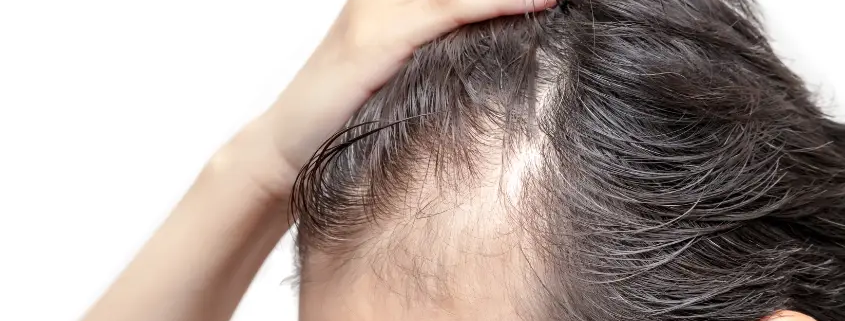Can Androgenic Alopecia Be Reversed?
Introduction
Hey there, curious minds! Have you ever wondered why some people lose their hair as they age? It’s a question that has puzzled scientists and many adults too. In this article, we’ll explore a common type of hair loss called Androgenic Alopecia, also known as male and female pattern baldness. It is a very common issue for both men and women but more. We’ll break it down into simple terms and find out if it’s possible to reverse it. So, please sit back, relax, and let’s dive into the world of hair loss together and solve this burning question, Can androgenic alopecia be reversed?
Understanding Androgenic Alopecia
Androgenic Alopecia may sound like a fancy term, but it’s just a way to describe hair loss that happens because of our genes and hormones. You see, our bodies have hormones like testosterone (mostly found in guys) and estrogen (mostly found in gals), and these hormones play a big role in whether we keep our hair or lose it. Androgenic alopecia is the most common reason for hair loss in men.
The Science Behind Hair Loss
To understand hair loss, we first need to know a bit about the hair growth cycle. Our hair grows from tiny hair follicles in our scalp. These follicles are like little hair factories, and they need a lot of things to work correctly, including blood flow and the right hormones.
Causes and Risk Factors of Androgenic Alopecia
Now, let’s get into the nitty-gritty of why some people lose their hair. There are a few main causes and risk factors for Androgenic Alopecia:
Genetics and Androgenic Alopecia
Imagine if your parents, grandparents, or even great-grandparents had hair loss problems. Well, that could mean you’re more likely to have it too! Genetics, or the traits we inherit from our family, can play a big role in Androgenic Alopecia.
Hormonal Imbalances and Hair Loss
Hormones are like messengers in our bodies, and sometimes they send the wrong messages to our hair follicles. In Androgenic Alopecia, the hormone androgen called dihydrotestosterone dht can cause hair follicles to shrink. When these follicles get smaller, they can’t make hair as well, and that’s when hair loss happens.
The Impact of Stress on Hair Health
You might be surprised to learn that stress can also be a factor in hair loss. When we’re stressed, our bodies produce more hormones, and this extra hormone activity can mess with our hair follicles. So, staying calm and relaxed is not only good for your mind but also for your hair!
Medications and Hair Loss
Some medicines such as topical minoxidil can have side effects, and one of them is hair loss. If you’re taking certain medications and notice your hair is thinning, it’s a good idea to talk to your doctor about it. They might be able to switch your medication or suggest ways to help prevent further hair loss.
The Reversibility of Androgenic Alopecia
Now, here’s the big question: Can Androgenic Alopecia be reversed? Well, it depends on a few factors. Let’s take a closer look.
Factors Influencing Hair Regrowth
The chances of regrowing lost hair depend on a few things, such as how long you’ve been experiencing hair loss, your age, and the cause of your hair loss. Hair loss that’s just starting might have a better chance of regrowth than hair loss that’s been going on for years.
Treatment Options for Androgenic Alopecia
There are different ways to tackle Androgenic Alopecia. Some involve medications, while others are more natural remedies. Let’s explore these options:
Medical Hair Loss Treatments and Their Effectiveness
1. Minoxidil: This is a topical medicine helpful in treating hair loss that you apply directly to your scalp. It can help some people regrow hair, but it doesn’t work for everyone. You have to be patient because it can take months to see results.
2. Finasteride: This is another medication, but it’s taken in pill form. It’s mainly for guys and can help slow hair loss and even promote hair regrowth in some cases. However, like any medication, it may have side effects, so it’s essential to talk to your doctor.
3. Hair Transplants: For some folks, hair transplant surgery can be an option. During this procedure, hair follicles are taken from one part of your body and moved to your scalp where you’re losing hair. It can be pricey and may require more than one session.
4. Laser Therapy: Some people use laser devices to stimulate their hair follicles. These devices emit low-level laser light to encourage hair growth. Results vary, and it’s best to consult with a healthcare professional before using them. Other treatments such as Platelet rich plasma (PRP) injections are also commonly used to treat androgenic alopecia.
Natural Remedies and Their Potential
1. Proper Nutrition: Eating a balanced diet with plenty of vitamins and minerals can help keep your hair healthy. Foods like eggs, nuts, and leafy greens are excellent choices.
2. Scalp Massage: Giving yourself a gentle scalp massage can help increase blood flow to your hair follicles, promoting hair growth.
3. Essential Oils: Some essential oils, like lavender and rosemary, are believed to promote hair growth. You can mix them with a carrier oil and massage them into your scalp.
4. Avoiding Tight Hairstyles: Wearing hairstyles that pull your hair tight can damage your hair follicles. Opt for looser styles to reduce stress on your hair.
Prevention Strategies for Androgenic Alopecia
Preventing Androgenic Alopecia can be a bit tricky because genetics play a role. However, there are still things you can do to help keep your hair healthy:
1. Healthy Lifestyle: Eating well, exercising regularly, and getting enough sleep can all help keep your body and hair in good shape.
2. Take a hair loss DNA test: By doing a genetic test for your genes, you can find out if you might have early signs of hair loss. Then, you can make changes to your diet and how you live to stop it from getting worse.
2. Stress Management: Find ways to manage stress, like meditation, yoga, or talking to someone you trust about your feelings.
3. Gentle Hair Care: Avoid harsh hair treatments and products that can damage your hair. Be gentle when combing or brushing your hair, especially when it’s wet.
4. Regular Checkups: Visit your doctor for regular checkups to catch any potential health issues early, which can help prevent hair loss.
Conclusion
So, can Androgenic Alopecia be reversed? Well, it’s not always easy, and it might not work for everyone. But with the right treatments, a personalized approach, a healthy lifestyle, and a little patience, you might be able to slow down hair loss and even regrow some of your lost locks. Remember, it’s important to talk to your doctor or a dermatologist to figure out the best plan for you. And hey, even if you don’t get back all your hair, remember that what’s inside your head is way more important than what’s on top of it!
Discover your unique hair loss risks and empower your hair care journey with our revolutionary HairLife DNA test. Take action today for a lifetime of beautiful locks. Learn more about the HairLife DNA test now!





